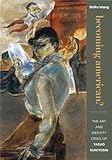Becoming American? The Art and Identity Crisis of Yasuo Kuniyoshi / ShiPu Wang.
Material type: TextPublisher: Honolulu : University of Hawaii Press, [2011]Copyright date: ©2011Description: 1 online resource (216 p.) : 38 illusContent type:
TextPublisher: Honolulu : University of Hawaii Press, [2011]Copyright date: ©2011Description: 1 online resource (216 p.) : 38 illusContent type: - 9780824834180
- 9780824860271
- 759.13 B 22
- ND237.K83 W36 2011
- online - DeGruyter
- Issued also in print.
| Item type | Current library | Call number | URL | Status | Notes | Barcode | |
|---|---|---|---|---|---|---|---|
 eBook
eBook
|
Biblioteca "Angelicum" Pont. Univ. S.Tommaso d'Aquino Nuvola online | online - DeGruyter (Browse shelf(Opens below)) | Online access | Not for loan (Accesso limitato) | Accesso per gli utenti autorizzati / Access for authorized users | (dgr)9780824860271 |
Frontmatter -- CONTENTS -- ACKNOWLEDGMENTS -- Introduction -- PRELUDE. Surviving Pearl Harbor -- CHAPTER ONE. Painting American -- CHAPTER TWO. Negotiating "Japaneseness" -- CHAPTER THREE. Picturing an Identity Crisis -- CHAPTER FOUR. Fighting the Battles Within -- CHAPTER FIVE. Wearing the Masks -- EPILOGUE. Becoming American? -- NOTES -- REFERENCES -- INDEX
restricted access online access with authorization star
http://purl.org/coar/access_right/c_16ec
"A few short days has changed my status in this country, although I myself have not changed at all." On December 8, 1941, artist Yasuo Kuniyoshi (1889-1953) awoke to find himself branded an "enemy alien" by the U.S. government in the aftermath of Japan's attack on Pearl Harbor. The historical crisis forced Kuniyoshi, an émigré Japanese with a distinguished career in American art, to rethink his pictorial strategies and to confront questions of loyalty, assimilation, national and racial identity that he had carefully avoided in his prewar art. As an immigrant who had proclaimed himself to be as "American as the next fellow," the realization of his now fractured and precarious status catalyzed the development of an emphatic and conscious identity construct that would underlie Kuniyoshi's art and public image for the remainder of his life.Drawing on previously unexamined primary sources, Becoming American? is the first scholarly book in over two decades to offer an in-depth and critical analysis of Yasuo Kuniyoshi's pivotal works, including his "anti-Japan" posters and radio broadcasts for U.S. propaganda, and his coded and increasingly enigmatic paintings, within their historical contexts. Through the prism of an identity crisis, the book examines Kuniyoshi's imagery and writings as vital means for him to engage, albeit often reluctantly and ambivalently, in discussions about American democracy and ideals at a time when racial and national origins were grounds for mass incarceration and discrimination. It is also among the first scholarly studies to investigate the activities of Americans of Japanese descent outside the internment camps and the intense pressures with which they had to deal in the aftermath of Pearl Harbor.As an art historical book, Becoming American? foregrounds broader historical debates of what constituted American art, a central preoccupation of Kuniyoshi's artistic milieu. It illuminates the complicating factors of race, diasporas, and ideology in the construction of an American cultural identity. Timely and provocative, the book historicizes and elucidates the ways in which "minority" artists have been, and continue to be, both championed and marginalized for their cultural and ethnic "difference" within the twentieth-century American art canon.
Issued also in print.
Mode of access: Internet via World Wide Web.
In English.
Description based on online resource; title from PDF title page (publisher's Web site, viewed 02. Mrz 2022)


